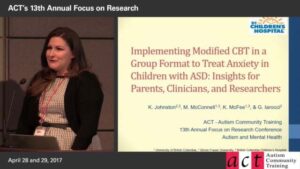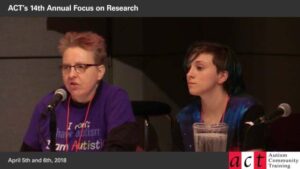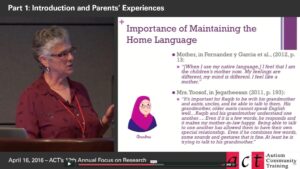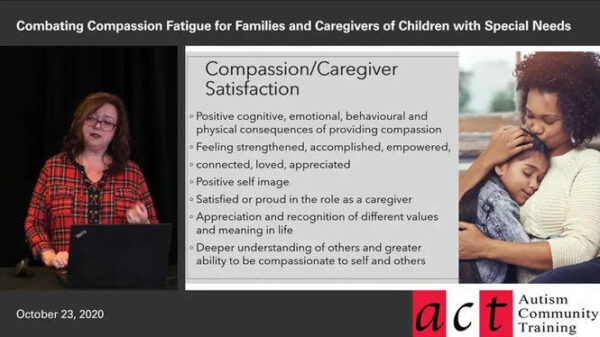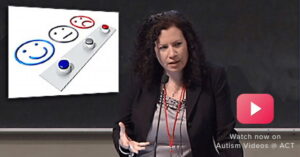Stephanie Jull, PhD
VP Programs, Training & Community Engagement, Canucks Autism Network
Filmed October 2020 – edited into 11 parts; total 145 minutes
In this practical presentation, Dr. Stephanie Jull, Canada’s leading trainer on promoting community inclusion for autistic individuals, provides parents and caregivers with innovative ideas on how to meaningfully involve their children in community-based recreation. The session begins with assessing the child’s interests, choosing an activity, as well as advocating for the right supports. Given today’s realities, virtual recreational opportunities in BC during the COVID era are also discussed, along with ways to help your child get the most out of these programs. Ideas for building recreation skills at home are also provided.
Building Community Recreation Skills – Presentation Handout (21 Pages)
Participant Workbook (PDF – 7 Pages)
Presenter Bio
Dr. Stephanie Jull is the VP of Programs, Training and Community Engagement at the Canucks Autism Network (CAN) – Canada’s leading organization in the provision of autistic children and adults with recreation opportunities. At CAN, Dr Jull oversees a team of staff and volunteers who provide hundreds of program spaces for children, youth and adults with ASD in recreation, social and employment programs in communities across British Columbia each year. In addition, CAN is committed to building capacity in the community. Every year, CAN’s training team provides workshops to hundreds of coaches, First Responders, employers, school personnel and other organizations to improve understanding, acceptance and support for individuals with autism across the province and beyond.
For more about Dr. Jull’s academic background and her commitment to community inclusion through research, see https://educ.ubc.ca/alumni-supporters/educatorprofiles2018/stephanie-jull-phd02/
Part 1: Introduction
Topics Covered:
- About Canucks Autism Network (CAN)
- About Stephanie Jull
- CAN’s work
Part 2: What is Community Recreation?
Topics Covered:
- A Framework for Recreation in Canada: Pathways to Wellbeing (2015)
- What’s included as community recreation?
- Municipal recreation, sport, other community activities, and family recreation
- Who delivers community recreation activities
Part 3: The Benefits of Physical Activity
Topics Covered:
- Benefits of participation
- 2018 ParticipAction Report Card
- Social connection
- Mental health
- Movement/physical activity guidelines by age group
- Social connection ‘skills’
Part 4: Where to Start: Assessing Interests
Topics Covered:
- Characteristics of autism
- Examples of athletes with autism diagnosis
Part 5: Family-Based Recreation
Topics Covered:
- Examples of family-based recreation
- Positives and challenges of family-based recreation
- Who can get involved?
Part 6: Other considerations with recreational programming
Topics Covered:
- What to do before registering for a program
- Fighting screen time
Part 7: Different Types of Community Recreation
Topics Covered:
- What are the options?
- Adapted, inclusive, mainstream
- Examples of community Recreation
- What makes these programs inclusive
Part 8: How to Choose a Recreation Program
Topics Covered:
- Consider the need to support
- Matching expectation to reality
Part 9: To Share or Not to Share?
Topics Covered:
- Pros and cons of disclosing a child’s diagnosis
- Disclosing diagnosis stories
Part 10: Advocacy in Community Recreation
Topics Covered:
- How to advocate for your person
- Who to speak to
- What to say
Part 11: Virtual Recreation Options
Topics Covered:
- Doing something active via a screen
- Positives and challenges of virtual recreation
- Other virtual recreation options
Additional Resources
- To see the second presentation in this series: Helping Your Child with Autism Thrive in Sport and Recreation
- CAN (Canucks Autism Network)



